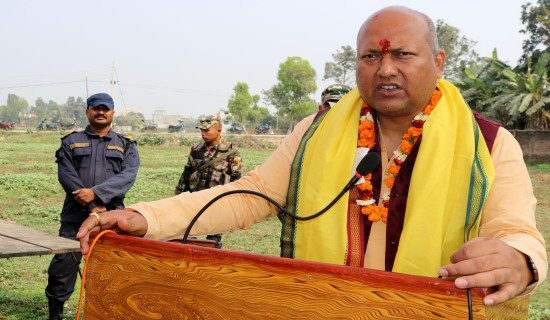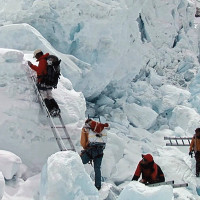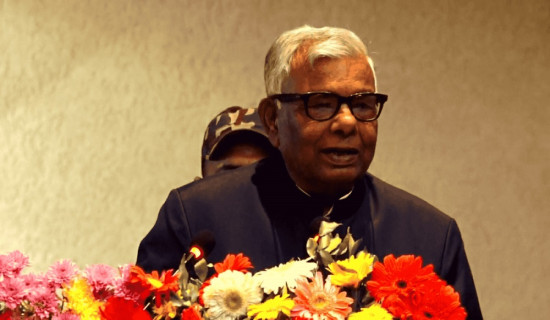- Thursday, 13 March 2025
Trump Strategy Rattles Allies
In this very column six days after the November 5 United States presidential election, I had strongly felt that the Ukraine war could for all practical purpose end by the time Donald Trump completed his first 100 days in office. Well, Trump gets inaugurated on January 20 and April-end marking the landmark date is slightly over 11 weeks away. The events since the last three weeks are unfolding fast and furious. The guns in Ukraine might stop shooting by summer, if not earlier.
Trump’s America is done with Kyiv, accusing President Volodymyr Zelensky of provoking Russia’s President Vladimir Putin to the war in Ukraine. Trump “advised” Zelensky to patch up a ceasefire soon. The message must have been clear. Kyiv and NATO are slowly coming to accept the fait accompli.
The war in Ukraine has incurred heavy losses for the Western bloc. Not only its credibility and unwillingness to fight on the frontline have been exposed. The man it backs is at a loss over coping with inherent problems faced by one of Europe’s poorest nations in Europe. Ukraine is ranked 104th in corruption index among 180 countries.
Trump’s inaugural oratory was a stunned story that hangs as an acutely painful embarrassment and humiliation for the US allies that find their hard pushed agendas in disarray. The hardest part for them is having to swallow developments that they can neither accept in public nor bear in mind in an unprecedented trauma inflicted by their closest cousin on the other side of the Atlantic.
Taboos fall
For good or bad, it is always a welcome trait when a leader comes out clear, with official agendas out in the open instead of something sinister. Trump talks tough and tries to walk it. He does not hesitate to exercise his powers to the point of overstretching interpretations. One of his first decisions was to issue a presidential pardon to 1,600 Capitol raiders who had gone on the rampage four years ago, alleging that victory was stolen from Trump.
So far at the start of Trump’s second innings at the White House, the news media have conspicuously mellowed to the point of being less audible and visible, as if they are hard on hearing and poor in sight. One of Trump’s bitter critics dubbed him as a “genius” in attracting attention.
Initially encouraged by the UK, prodded by Germany and reassured by the US, Zelensky refused a ceasefire that would have happened in 2022 itself, long before hundreds of thousands were killed and eight million people displaced. Today, things are falling apart, leaving Zelensky in a painful lurch. Trump blames the Joe Biden administration for plans to draw Ukraine into the NATO embrace. The EU has already given Ukraine $132 billion. Think tanks estimate that the war-ravaged country will need $500 billion to rebuild the country. NATO countries like Hungary and Slovakia are against the proposal drawn up by other members of the defence organisation.
Zelensky’s five-year term in office has been extended on consensus among political parties. Citing the ongoing war and the martial law in effect, the presidential election, originally scheduled for March-April 2024, is now indefinitely postponed. Europe’s gas and oil price hike contributed to manufacturing costs and inflation. The US did not offer them oil at subsidised rates, which technically upholds the spirit of free market and capitalism in letter.
He announced withdrawal from WHO, in a policy continuation of his first term. The US has also pulled out of the Paris Climate Agreement. Swift action has begun to deport illegal immigrants who “invaded” and caused chaos in the US that hosts an estimated 15 million illegal immigrants. The USAID, with an annual budget of $40 billion, is put on hold for a thorough review.
Last week, Trump announced US pullout from the United Nations Human Rights Council and ordered a review on its involvement in the United Nations Educational, Scientific and Cultural Organisation. His latest order issued visa sanctions on the Hague-based International Criminal Court, which he termed “illegitimate”.
Trump demands that American allies spend adequately for their own defence. His decision to slap new tariffs on Canada, Mexico and China suggests that the European Union could be the next target, given his accusation the trio of treating the US “very, very unfairly” on trade. The EU Commission has tried to put a bold face saying that it would retaliate “firmly” if Trump hit it hard. It is weighing ways of diversifying its trading partners to expand its market options. If a union full of first cousins like the EU could be treated so hard, would Trump spare India, the most-populous country but still with a poverty-stricken population of some 170 million. Trump has publicly termed India “a tariff imposing country”.
Early results
Retaliation made Trump hold the tariff hike from a few weeks in the cases of Canada and Mexico and to three months in China’s case. Canada pledged to step up vigilance on the borders against illegal immigrants crossing over to the US. Mexico, too, agreed to amass 10,000 troops on the border to prevent banned drugs and illegal immigrants from entering the US. On China’s part, Beijing’s move to raise add 10 to 15 per cent tariff on goods imported from the NATO leader. The new president brooks no obstacles to his frontier policy that hints of expansion and continued global agenda-setting, covering territorial borders and what he perceives as national security and economic interests.
He speaks unconventional language that US allies in especially the EU can neither condemn nor commend. That is the price of having lived far too long on reflected power and glory of the US. Even if Trump’s decisions might seem heavy-handed for his customary critics who dominate public platforms, they are taking time for composure recovery to fire their ire at the audacity. He now cuts a tough figure, but faces the test of popular evaluation by the end of the year. The pace and volume of delivery in action will judge him. Payback time is bound to come once Trump shows signs of faltering.
As months progress and events unfold, people will start computing Trump’s achievements in substance. The economy, salary gaps, woke culture, law and order, and American international clout are the key areas of national focus. For the present, Trump makes the most of his power. That is the portrayal of the new chief executive issuing directives from the White House. The end result might be different, though.
(Professor Kharel specialises in political communication.)






-original-thumb.jpg)










